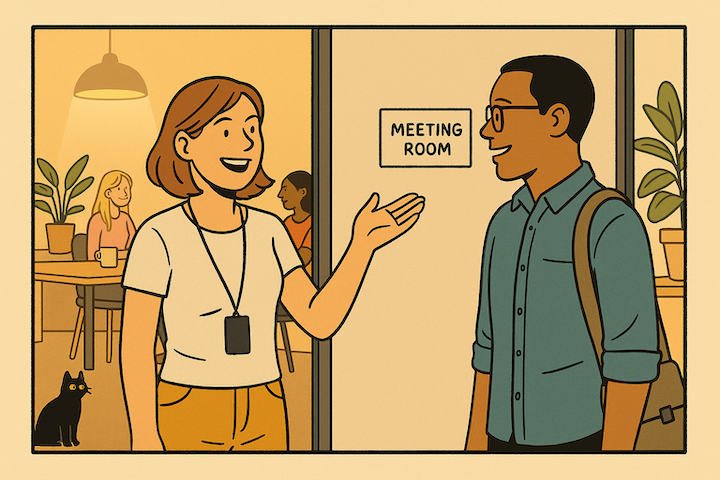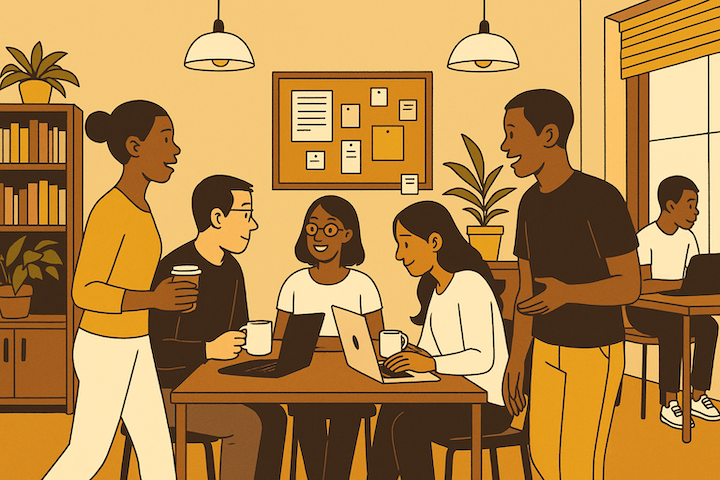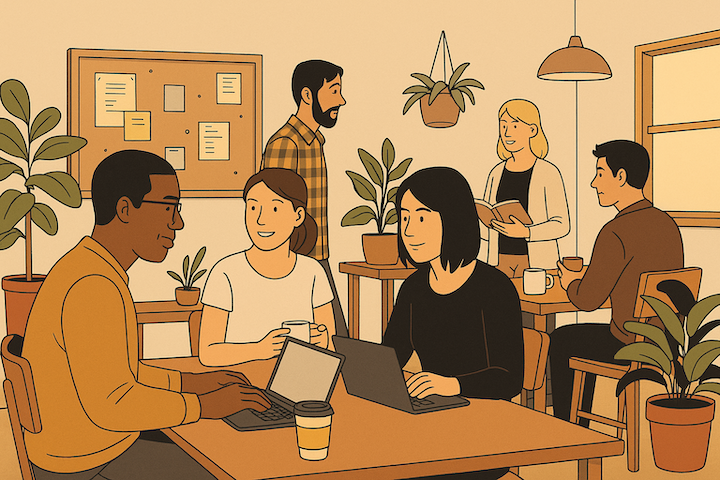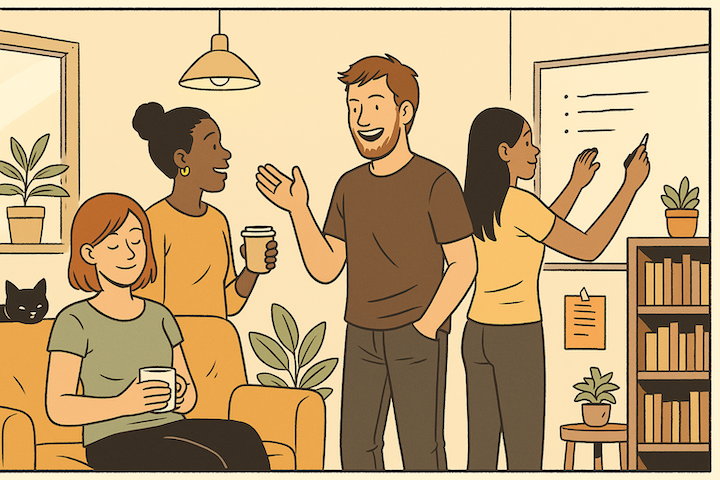This is a guest post by DeShawn Brown, CEO at Coworks, a software solution for today’s flex and coworking spaces. (And one of our amazing CJ Co partners.)
When it comes to building community, software can’t do the job. Gotcha! It’s a trick title.
But that was the presentation I had the privilege of giving as a workshop for folks in Cat Johnson’s Lab, as well as outside. The full recording is available for all Lab members. (And if you aren’t a member but you use Coworks, remember you get a full free month in The Lab!)
While software can’t create community by itself, it can absolutely accelerate and enable the natural connections that people are already inclined to make.
Just think of platforms like Airbnb and Uber—they didn’t invent the behaviors they support; they just made them easier. We’ve learned so much from our own Coworks customers about what they need, and our goal is to empower community managers to take those needs and supercharge them with the right tools.
So, let’s dive into how space management software can help you do just that.
1. Know your members (personally)
The better you know your members, the better you can serve them. Understanding what makes your members tick, both personally and professionally, is the foundation of building a meaningful community.
This seems obvious, but this is where technology is your friend. Your space management software can help by keeping track of key information that gives you insight into their needs.
How: A member directory with custom fields
A strong member directory is more than just a list of names. It’s a place where you can store both external data (the information members provide, like birthdays and business details) and internal notes your team captures, such as preferences or needs.
These fields can even help you remember small details—like that someone prefers tea over coffee, or that a certain team likes to collaborate with marketing firms.
Pro tip: Capture details about both individual members and teams. Teams have their own dynamics and needs, even if the people fluctuate. Track their projects, audiences, and goals to serve them better.
Jamie Russo of Everything Coworking once shared how keeping tabs on members’ favorite snacks and putting them on a daily cart transformed the member experience at one coworking space—small personal touches like these go a long way. Or member anniversaries as celebrated at OneValley, where capturing member milestones is automated through their software. It’s a little gesture, but it helps members feel appreciated. That information isn’t locked away in the manager’s memory. It was captured and stored in software.
But how will you encourage your members to provide the information? Make it fun! Davidson University used a Bingo Card to gamify app adoption. They gave away fun prizes. Even better, they gave us permission to create a version of the card for anyone to use for their software.
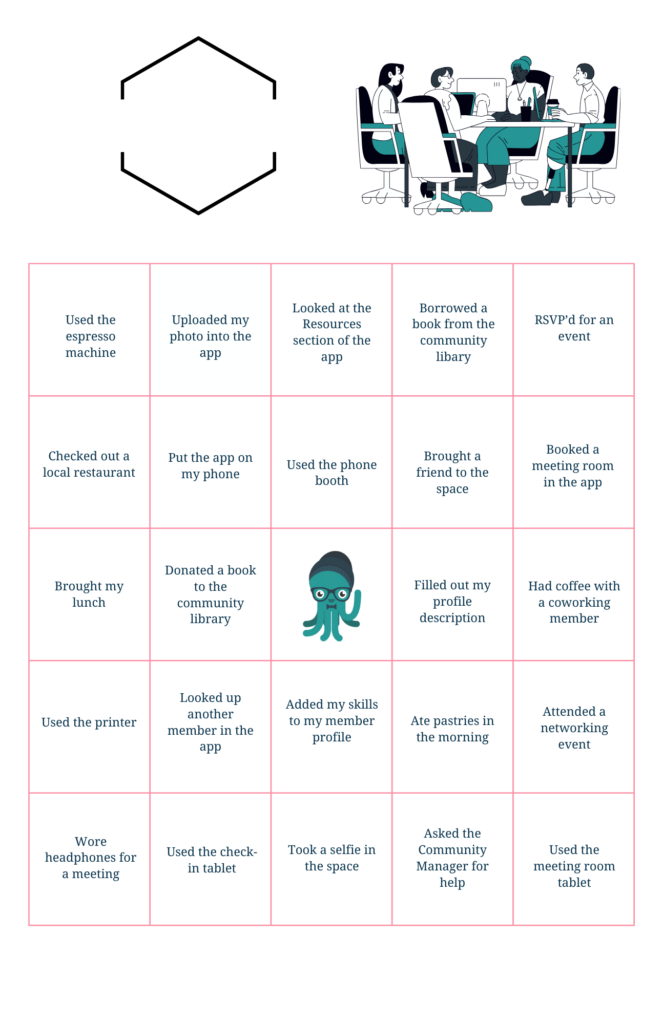
2. Provide excellent service and hospitality
At the heart of a great coworking space is the hospitality you provide. This is where your space can truly stand apart from managed offices.
It’s not just about the physical space; it’s about creating an experience that feels welcoming and personal.
How: Let software handle the heavy lifting
Your software can help you organize perks and resources in a way that’s easy for members to access, freeing you up to focus on personal connections. Set up a resources tab for FAQs and essential documents, and use events and booking features to streamline event planning, from RSVPs to reminders. These tools help make sure members know what’s available and can participate easily.
You can also partner with local shops and restaurants to offer discounts or perks, such as free member breakfasts or exclusive events.
Spaces like Raleigh Founded provide discounts at the YMCA, encouraging community-building through shared experiences. And at The Commons, members are treated to breakfast spreads that appear right in their events feed. Members not only enjoy a meal together but can also easily RSVP and stay informed through the software.
3. Make stuff easy
Finding the sweet spot between concierge service and self-service is key. Too much automation can make the experience feel impersonal, while too little can cause friction.
How: Balance self-service with personal touch
Your space management software should make it easy for members to help themselves when needed—whether that’s booking rooms, updating payments, or finding essential resources. Simplifying these processes gives members the independence they want while maintaining the community vibe.
Make sure new members feel “move-in ready” by streamlining onboarding. For example, MASS Collective makerspace uses their software to centralize training on their wide array of fabrication machines, plus booking, billing, and FAQs, so members can get started right away.
Then there is the onboarding automation at RTP Frontier, where the software simplifies orientation for both free coworking and tenant spaces. Members can walk in, get settled, and focus on what matters — connecting and working.
4. Let your members (and the data) tell you what they want
Understanding how your space is being used is crucial. Your members’ behavior, event attendance, and even the rooms they book provide valuable insights. Use that data to shape your services and offerings, making sure you’re meeting real needs rather than relying on assumptions.
How: Track and respond to data
Use data from your space management software to stay informed about how members engage with your space. Collect feedback through surveys or feedback forms sent through automation, and use check-in data and room usage stats to optimize your offerings.
Back to The Commons, data showed that their private office offering wasn’t the hit they expected — hot desks turned out to be the top seller. Same with Lime Tree Work Shop. Paying attention to what members use and enjoy allows you to pivot quickly and ensure your space remains relevant.
5. Give your members opportunities to connect
At the end of the day, a coworking space isn’t just about the amenities — it’s about the connections members make with each other. Whether it’s casual networking or planned events, your software can help facilitate those connections by organizing events, managing RSVPs, and even supporting member groups.
How: Foster connection with events and member groups
Encourage members to create their own groups, from game night clubs to fitness groups. Your software can help with scheduling, event management, and even RSVPs, making it easier for members to find their tribe and build community.
Birch Road uses member groups to connect their community, while Three Cities Social allows members to create their own events, whether it’s a wine club or a walking group. These spontaneous connections are often where the magic happens.
6. Simplify the sales funnel to grow your community
Growth should always be top of mind, and your sales process plays a big role in bringing new members into your community. If the process is clunky or confusing, you may lose potential members before they even get started.
How: Use automation to simplify nurturing and onboarding
Your space management software can streamline the sales funnel by automating sign-ups, handling emails, and simplifying notifications and payments. Consider offering day passes or trial memberships to allow prospects to experience your space before committing fully.
At RTP Frontier, guests can sign up for a day pass with just a few clicks, experiencing the space firsthand before deciding to join. This low-barrier approach helps prospects see the value of the community, not just the space.
With the right space management software, building and nurturing your coworking community becomes more manageable, allowing you to focus on what matters most—creating connections and helping people grow together.
Thanks to our friends and partners at Coworks! Get in touch with DeShawn and the team for guidance and support with your coworking space software.
The Coworking Letter
For coworking pros


Get insights, strategies and practical to-do's every Thursday.




